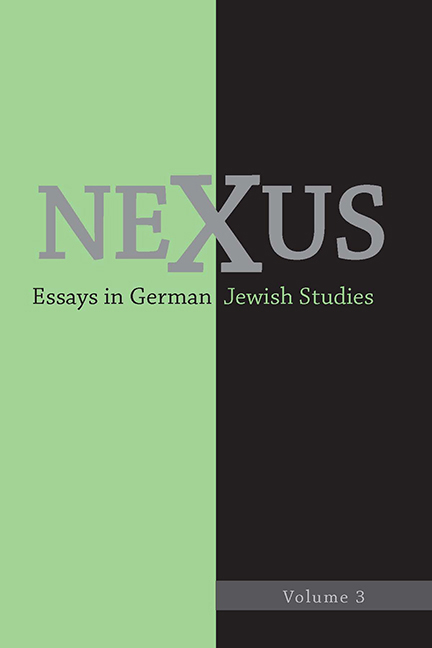Book contents
- Frontmatter
- Dedication
- Contents
- Acknowledgements
- Introduction
- “Ein weites Feld”: Ein Wort zu deutsch-jüdischen Studien anläβlich der Verleihung des ersten Egon Schwarz Prize for the Best Essay in German Jewish Studies
- “An Open Field”: A Word about German Jewish Studies on the Occasion of the Presentation of the first Egon Schwarz Prize for the Best Essay in German Jewish Studies
- Laudatio for Abigail Gillman's Prize-Winning Nexus Essay: “Martin Buber's Message to Postwar Germany”
- Heinrich Heine in Modern German History, by an Eyewitness
- Jeffrey Sammons, Heine, and Me: Some Autobiographical Reflections
- Heine's Disparate Legacies: A Response to Jeffrey Sammons
- My Debt to Heine and Sammons
- Die letzten Tage der Menschheit as a German-Jewish Tragicomedy, and the Challenge to Translators
- Edward Timms's “Die letzten Tage der Menschheit as a German-Jewish Tragicomedy and the Challenge to Translators”: A Response
- Kraus the Mouse? Kafka's Late Reading of Die Fackel and the Vagaries of Literary History
- The Parable of the Rings: Sigmund Freud Reads Lessing
- The Poetics of the Polis: Remarks on the Latency of the Literary in Hannah Arendt's Concept of Public Space
- The Marrano in Modernity: The Case of Karl Gutzkow
- German Jews Dogged by Destiny: Werewolves and Other Were-Canids in the Works of Heinrich Heine and Curt Siodmak
- Authenticity, Distance, and the East German Volksstück: Yiddish in Thomas Christoph Harlan's Ich Selbst und Kein Engel
Heinrich Heine in Modern German History, by an Eyewitness
Published online by Cambridge University Press: 11 May 2017
- Frontmatter
- Dedication
- Contents
- Acknowledgements
- Introduction
- “Ein weites Feld”: Ein Wort zu deutsch-jüdischen Studien anläβlich der Verleihung des ersten Egon Schwarz Prize for the Best Essay in German Jewish Studies
- “An Open Field”: A Word about German Jewish Studies on the Occasion of the Presentation of the first Egon Schwarz Prize for the Best Essay in German Jewish Studies
- Laudatio for Abigail Gillman's Prize-Winning Nexus Essay: “Martin Buber's Message to Postwar Germany”
- Heinrich Heine in Modern German History, by an Eyewitness
- Jeffrey Sammons, Heine, and Me: Some Autobiographical Reflections
- Heine's Disparate Legacies: A Response to Jeffrey Sammons
- My Debt to Heine and Sammons
- Die letzten Tage der Menschheit as a German-Jewish Tragicomedy, and the Challenge to Translators
- Edward Timms's “Die letzten Tage der Menschheit as a German-Jewish Tragicomedy and the Challenge to Translators”: A Response
- Kraus the Mouse? Kafka's Late Reading of Die Fackel and the Vagaries of Literary History
- The Parable of the Rings: Sigmund Freud Reads Lessing
- The Poetics of the Polis: Remarks on the Latency of the Literary in Hannah Arendt's Concept of Public Space
- The Marrano in Modernity: The Case of Karl Gutzkow
- German Jews Dogged by Destiny: Werewolves and Other Were-Canids in the Works of Heinrich Heine and Curt Siodmak
- Authenticity, Distance, and the East German Volksstück: Yiddish in Thomas Christoph Harlan's Ich Selbst und Kein Engel
Summary
AS I SURVEY MY CAREER as a Germanist, it is evident to me that I have been drawn to neglected topics, or, to put it another way, to matters in which no one else is interested. This may seem like a strange claim for someone who has been specialized in the booming and buzzing topic of Heinrich Heine, but the fact is that, when I was a beginner, it was fairly quiescent. Heine was nowhere near the forefront of German literary studies. Today the modern epoch of Heine studies is dated from the founding of the Heine-Jahrbuch in 1962, but the first volumes were thin and unprepossessing. It avoided controversy on principle and to that end for the first twelve years carried no book reviews. The neglect of Heine is sometimes ascribed to an afterlife of the fascist spirit and antisemitism in the Adenauer restoration, but I do not think that was the case, even though there may have been some effect from the suppression of his memory in the Nazi years. Rather, the devaluation of Heine is a phenomenon of the early twentieth century. His reputation was robust in the second half of the nineteenth century, largely based on his poetry, especially as carried out into the world, in Heine's phrase, “Auf Flügeln des Gesanges” (On the Wings of Song), in what are by now are some 11,000 musical settings. It is said that of the poets in world literature, only the Biblical psalmist has been set to music more often than Heine. But at the turn of the nineteenth to the twentieth century there was a great advance in the quality of German poetry. Heine's lyric, which had rarely been carefully read, came to seem simplistic and sentimental, as well as rather worn out by the constant performance of the Lieder settings. It did not appear to pass muster in the age of Hofmannsthal, Rilke, and Stefan George. Anthologies of the best of German poetry edited by George and Karl Wolfskehl (1902) and by Rudolf Borchardt (1906) marginalized Heine and disparaged him, sometimes with antisemitic insinuations.
- Type
- Chapter
- Information
- Nexus 3Essays in German Jewish Studies, pp. 19 - 32Publisher: Boydell & BrewerPrint publication year: 2017

